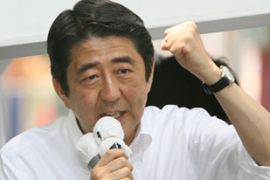Abe faces election test in Japan
Forecasts suggest the PM’s ruling coalition is likely to lose upper house elections.

Published On 29 Jul 2007
Ratings dropping
Newspapers last week showed the prime minister’s approval rating had dropped to just under 30 per cent.
The LDP and its coalition partner, New Komeito, need a total of 64 seats to keep their majority in the upper house.
New Komeito is aiming for 13 seats, meaning the LDP will need to secure another 51 seats.
But support for Abe has steadily declined since he took up office in September, with his government suffering a series of scandals. including the apparent suicide of Toshikatsu Matsuoka, the Japanese farming minister, in May.
Matsuoka had been due to answer questions over an investigation involving misuse of political funds.
Opposition
| Japan’s upper house |
|
– Chamber has 242 seats. – Members serve for six years, with an election for half the seats every three years. – Less powerful of parliament’s two chambers as budgets and treaties can be enacted without its approval and it does not select the prime minister. – But can reject bills approved by the lower house and legislation can then only be enacted by a two-thirds majority in the lower chamber. |
Japan’s Daily Yomiuri newspaper says the Democratic Party of Japan (DPJ), the main opposition party, has a chance to win more than 60 seats on its own, which would make it the biggest party in the upper house.
But the upper house is the least powerful of the Japanese parliament’s two chambers and Abe’s ruling LDP and New Komeito coalition, which together control the lower chamber, will not be ejected from government if it loses on Sunday.
However, in the past, after suffering a defeat in the upper house, prime ministers have resigned and there has been some speculation as to who would follow Abe.
Analysts, though, say his chances of clinging to power depend on the size of his coalition’s defeat, but some add that the lack of a viable successor could also help him to keep his job.
Martin Schulz, a research fellow at Fujitsu Research Institute, said: “I do not expect Abe to step down. There is very little chance for the LDP to fix anything by doing so.”
Meanwhile, Abe has said he intends to continue with his reform agenda.
Writing in his weekly email magazine, he said: “The challenge of these reforms has begun to move surely, step by step… Whatever the circumstances, I want to fulfil my mission by steadily promoting reforms, without losing sight of the starting point.”
But without a ruling bloc majority, laws would be hard to enact, threatening paralysis for the government.
Furthermore, Abe’s coalition would need to woo independents, members of small parties and disaffected lawmakers from the DPJ to deliver on its programme.
Source: Al Jazeera, News Agencies
